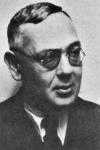Blas Infante


Blas Infante Pérez de Vargas (Casares, Spain; 5 July 1885 – Seville, Spain; 11 August 1936). Blas Infante was an Andalucista politician, writer, historian and musicologist, known as the father of Andalusian nationalism (Padre de la Patria Andaluza).[2]
Infante was a Georgist idealist who initiated an assembly at Ronda in 1913. This assembly adopted a charter based on the autonomist Constitución Federal de Antequera written in 1883 during the First Spanish Republic.[3] It also embraced the current flag and coat of arms as "national symbols", designed by Infante himself based on various historic Andalusian standards.[4] During the Second Spanish Republic, the Andalucismo was represented by the Junta Liberalista, a federalist political party led by Infante.
Infante was among numerous political figures who were summarily executed by Franco's forces when they took over Seville at the beginning of the Spanish Civil War. As both a regional autonomist and a kind of libertarian socialist, he twice "merited" inclusion on their liquidation list.
His last residence in Coria del Río now hosts the Museum of Andalusian Autonomy.
Published works
- (in Spanish)
 Ideal Andaluz. Wikisource. 1915.
Ideal Andaluz. Wikisource. 1915. - La Obra de Costa (1916)
- La Sociedad de Naciones (with J. Andrés Vázquez, 1917)
- (in Spanish)
 Manifiesto Andalucista de Córdoba de 1919. Wikisource. 1919.
Manifiesto Andalucista de Córdoba de 1919. Wikisource. 1919. - Motamid, último rey de Sevilla (1920)
- Cuentos de Animales (1921)
- Los Mandamientos de Dios a favor de los animales (1921)
- La Dictadura pedagógica (1921)
- Reelección Fundamental - Primer Volumen - La Religión y la Moral (1921)
- Orígenes de lo flamenco y secreto del cante jondo (1929–31)
- La verdad sobre el complot de Tablada y el Estado libre de Andalucía (1931)
- Cartas Andalucistas de Septiembre de 1935 (1935)
- Manifiesto a todos los andaluces (1936)
Unpublished works
- Fundamentos de Andalucía - 1ª serie de Cartas Andalucistas (unpublished, 1929)
- El Libro Nuevo (unpublished)
- Almanzor (unpublished)
In popular culture
The 2003 film Una pasión singular by Antonio Gonzalo features the life of Blas Infante.
Notes
- ↑ (Spanish) Parliament of Andalusia: Blas Infante, Father of Andalusia
- ↑ http://www.congreso.es/public_oficiales/L7/CONG/BOCG/D/D_448.PDF
- ↑ (in Spanish)
 Constitución Federal Regional para Andalucía [Andalusia Regional Federal Constitution]. Wikisource. 1883.
Constitución Federal Regional para Andalucía [Andalusia Regional Federal Constitution]. Wikisource. 1883. - ↑ (Spanish) Junta de Andalucía: Symbols of Andalusia
| Wikisource has original works written by or about: Blas Infante |
|